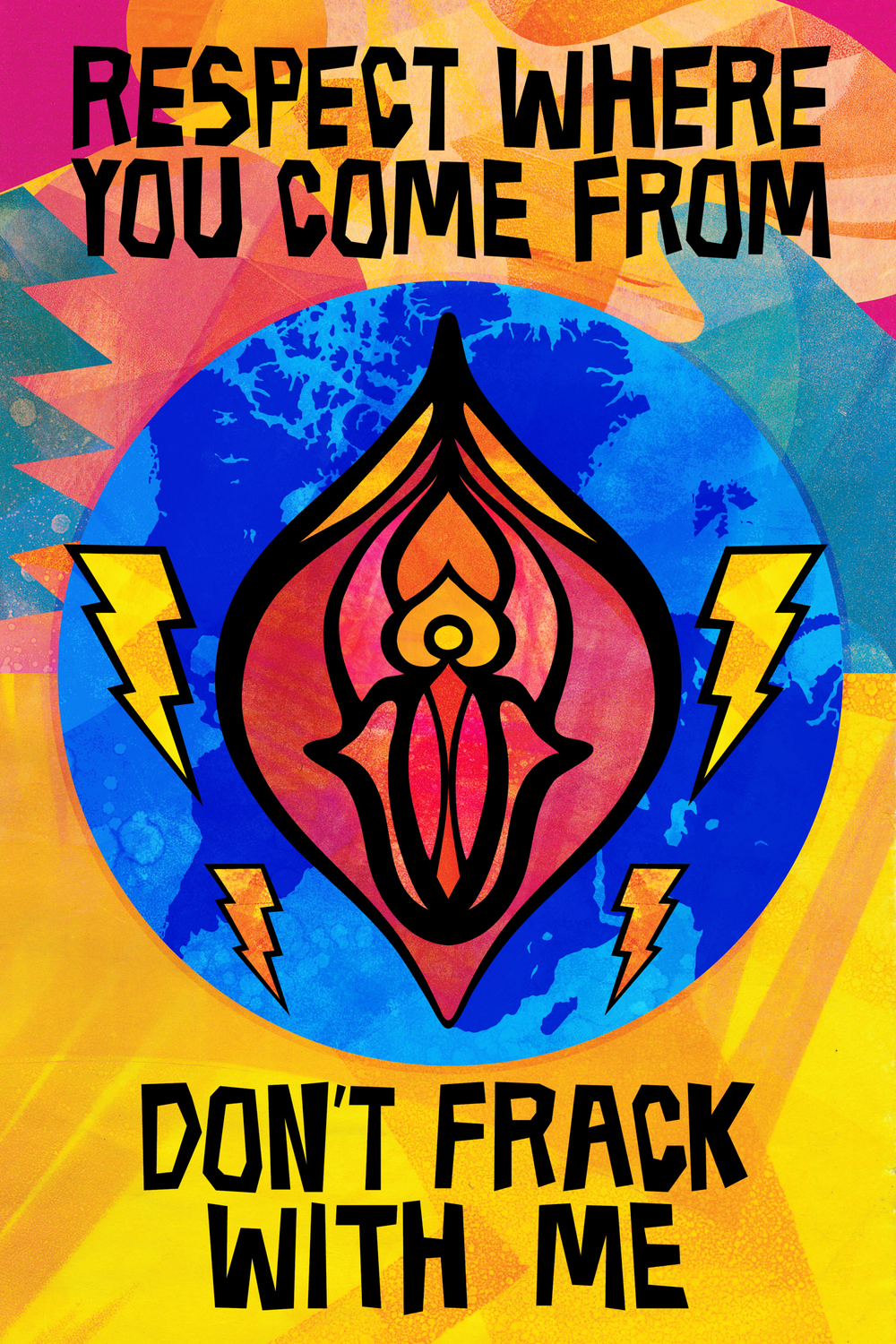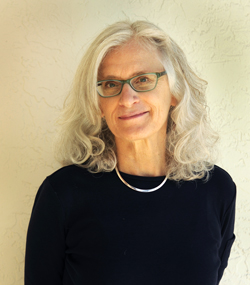This excerpt is from Call Your “Mutha’”: A Deliberately Dirty-Minded Manifesto for the Earth Mother in the Anthropocene (Oxford University Press) by Jane Caputi
When Earth Becomes an “It”
When the people call Earth “Mother,”
they take with love
and with love give back
so that all may live.
When the people call Earth “it,”
they use her
consume her strength.
Then the people die.
Already the sun is hot
out of season.
Our Mother’s breast
is going dry.
She is taking all green
into her heart
and will not turn back
until we call her
by her name.
Marilou Awiakta
(courtesy of Fulcrum Publishing)
INTRODUCTION
In the Name of the “Mutha’”
THIS BOOK TURNS ON THE word motherfucker. It is a word that springs from the genius of what Geneva Smitherman calls “Black Talk.” and bears a seemingly infinite range of variations— muthafucka’, mothafucka—and meanings, from the very worst thing you can call someone to the very best and sometimes, even, nothing at all.
The word here is that the Man as well as the Human in the proposed new geological age—the Anthropocene (“Age of Man” or “Age of Humans”)—does not signify everyone of our species. The Man behind the Anthropocene is the motherfucker in the word’s original and worst sense (the most vicious of oppressors and exploiters). At the same time, perennial Mother Nature-Earth epitomizes that word’s best sense—the “Mutha’,” the indomitable, inexhaustible, uncategorizable, and untranslatable (into official terms of gender and everything else) force-source of continuous birth, growth, death, transformation, and renewal.
The classification of the Anthropocene is intended to address the qualitative impact that humans are having on the global eco-system. The present time is characterized by the seemingly bound-less reach of technological mastery, but also loss of habitat and early death for many human and other-than-human beings, mass extinction, climate change, environmental migrations as people flee adverse ecological shifts, a new Nuclear Age, pandemics, topsoil blowing away forever in the wind, a plastic ocean, wars over oil as well as water, a world without birds and bees, an insect apocalypse, an airpocalypse, and an all-round eco-apocalypse. Despite obvious cause for alarm, Anthropocene enthusiasts and even some critics remain confident that humanity’s manifest destiny is to conquer nature, and that these troubling matters can be resolved with the application of a uniquely human ingenuity as well as further penetration into nature’s secrets.
There are vital scholarly critiques of the Anthropocene and its arrogance and injustices, particularly its embeddedness in racism, colonialism, and consumer capitalism. There remains a need for recognition of the ways that the Anthropocene is simultaneously the expression of the inherent rapism of a misogynist and heteropatriarchal culture. Too few, even of the era’s critics, reckon with the common understanding of ecocide as the rape of the Earth. Nor do they face the reality of Mother Nature-Earth and wonder what that original force-source might have to say about all this.
What calls me to this work, then, is twofold. One purpose is to continue the consideration of the related oppressive hatreds and violences, all infused with the fear of (inner and outer) nature, that have led to the Anthropocene. Another is to invoke the “Mutha’,” to “call on . . . appeal to . . . summon . . . conjure . . . utter (a sacred name)” (OED). This conjuration itself participates in the “Mutha’s” powers of ending one way and beginning another. Calling the “Mutha’” is to refuse to reproduce the Anthropocene and to create something new.
Accordingly, I rely on sources and directions heretical to the ruling episteme. As I am an American studies scholar, I consult primarily the knowledge brought to bear by cultural theorists, philosophers, scientists, artists, and thinkers from this part of the world, and specifically Indigenous and African diasporic ones. I also attend closely to poetry, song, my own dreams, visual culture, speculative fictions, activist watchwords, and a resistant oral tradition carried by select pockets of folklore, popular culture, and language, including in some words characterized as obscene — notably, motherfucker.
That word was born in 19th-century slavery to name the White slave master, according to the African American oral tradition. Here is the Man behind the “Age of Man,” and mother-fucking is his defining act. Let’s break it down. The word mother is manifold, evoking the “source” (OED), from the personal to the planetary. The verb fuck reveals heteropatriarchy’s fusion of sex and violence, holding concomitant definitions of “to engage in sexual intercourse” and to “harm irreparably; finish; victimize.” Motherfucking is forced sexualized entry into, harm, domination, possession, spirit-breaking, exploitation, extraction, and wasting of another for reasons of power, pleasure, plunder, and profit. Motherfucking aims to turn the source into a resource. Motherfuckers include rapists, abusers, “pussy” and land grabbers, slave masters, colonizers, conquerors, exploitative governmental leaders, and many of those peopling the highest ranks of militaries and corporations, notably those of fossil fuels and the industrial farming of plant and animal beings. The Anthropocene, in short, is The Age of the Motherfucker.
But that is by no means the end of the story. Motherfucker, like all living words, moves and evolves. As time passed, the word turned, showing another face and taking on positive meanings. One contributor to the online Urban Dictionary defines motherfucker as a “formidable and inexorable force.” All this can lead to a recognition of Mother Nature-Earth as the “Mutha’”— the fluid, adamantine, female, femme, non-binary, positive and negative force-source that brings all into being and keeps all going. This “Mutha’” power is strategically unnamed and unacknowledged in standard White English. Quiet as The Man might try to keep it, the “Mutha’” is the power capable of overwhelming him in the Anthropocene, not the other way around.
As a White, cisgender woman and feminist scholar, I put “Mutha’” in quotation marks to acknowledge my indebtedness to Black Talk and to the speakers, philosophers, artists, theologians, rappers, theorists, linguists, poets, singers, and seers who originally put forth and spin out the word’s powers. These include powers of the curse and the swear as well as those of the prayer. These three interrelated powers provide the structure of this book, which begins with Invocation, moves into The Curse, answers that with The Swear, and concludes with Convocation.
Raised to be a good Catholic, I was taught to begin an invocation by saying “In the name of the Father”—a piety affirming a world of men over women, up over down, light over dark, thought over feeling, and mind over matter. As befits this work, appearing as it does in a series on heretical thinking, I deliberately go contrary-wise to pieties both religious and rationalist. I begin and end in the name of the “Mutha’.”
Notes:
I completed the final copy-editing phase of Call Your “Mutha’” in March 2020, just as the Covid-19 pandemic was beginning, so I didn’t comment extensively on it in the book. Nonetheless, it’s not hard to apply the ecological knowledge of the “Mutha’” to this crisis. Autonomous Nature (of whom humans are a part) abides and rules and must be respected.
Basically, the pandemic’s cause, as well as the cause of climate change, deforestation, mass extinction, and the premature death of countless colonized other than human beings and marginalized human beings – is systemic motherfucking. The introduction of pathogens like Covid-19 directly results from the ongoing violation of wild spaces and beings for reasons of pleasure, power, plunder and profit – e.g., for mining, biofuels, and agribusiness. But do not confuse pandemics, climate change, and extinction with the storied punitive actions of an angry deity, as in Old Testament-type narratives. Rather, these are the planet’s intelligent response to disruption and violation, a kind of rebalancing, albeit one that alters the patterns that have sustained human existence.

An artwork from Favianna Rodriguez brilliantly exposes the motherfucking stratagem while also communicating the “Mutha’s” response and naming the only possible solution. The work has at its center the blue-green, round Earth, shown clearly as a cunt in warm hues of red, orange, and yellow. Lightning bolts flash to either side of the labia, signifying revelation, sound, creation, destruction, and fertility, as well as the male energy intrinsic to the whole bodacious bundle.This Earth “Mutha’” demands: “respect where you come from.” The text along the bottom makes it specific: “don’t frack with me.” Rodriguez explains: “The way we treat women is the way we treat the planet, and vice versa.” Rodriguez’s Earth Cunt lays down the principle of respect, a concept that deserves elaboration.
Historian and philosopher Vine Deloria, Jr. (Standing Rock Sioux) teaches that because we are enmeshed in a “living universe,” there is a firm requirement for “mutual respect among its members, and this suggests that a strong sense of individual identity and self is a dominant characteristic of the world as we know it. The willingness of entities to allow others to fulfil themselves, and the refusal of any entity to intrude thoughtlessly on another, must be the operative principle of this universe.” When some humans act disrespectfully, for example by entering without appropriate care into other animals’ homeplaces to hunt, harvest, mine, or log, this has consequences – including a hungry virus jumping to human hosts.
The respect demanded by the Earth “Mutha’” is not the usual “Who’s your Daddy”–type demand for deference and adherence to hierarchy. Rather, this respect is based in strong and sure self- and other-awareness and the concomitant requirement to act accordingly.
In her great poem “When Earth Becomes an ‘It.’” Awiakta makes it clear that Mother Earth, in the face of systemic disrespect, can just turn away. This autonomous force-source thinks, decides, gives, takes, comes and also can go. To call the “Mutha’” is to call as in to cry out—in multiple ways and voices, individual and collective—to tell the truth about what is going on, to attract attention, to ask forgiveness, to implore help, to pay what we owe, and to fulfil our spiritual/material obligations to respect the force/source – our planet/ourselves – from whom we all have come and to whom we necessarily return.
About the Author

Jane Caputi is Professor of Women, Gender and Sexuality Studies and Communications & Multimedia. In 2016, the Popular Culture Association named her the Eminent Scholar of the Year and in 2020 Association for the Study of Women in Mythology gave her their annual Saga Award for contributions to women’s history and culture. She has made two educational documentaries: The Pornography of Everyday Life (2006) and Feed the Green: Feminist Voices for the Earth (2015). Caputi’s books include The Age of Sex Crime (1987), Gossips, Gorgons and Crones: The Fates of the Earth (1993), Goddesses and Monsters: Women, Myth, Power and Popular Culture (2004) and Call Your “Mutha’” A Deliberately Dirty-Minded Manifesto for the Earth Mother in the Anthropocene, Oxford University Press, 2020, in a series on “Heretical Thought” edited by Ruth O’Brien. She also collaborated with Mary Daly on Websters’ First New Intergalactic Wickedary of the English Language and has conceptualized and co-curated three visual cultural exhibits on presidential popular culture sponsored by the FAU Schmidt Galleries: Political Circus (2008), Political Sideshow (2016) and Political Pandemonium, upcoming for fall 2020.
Return to top